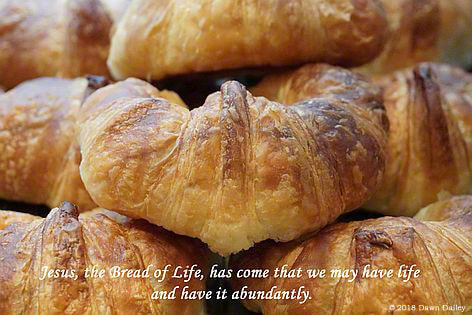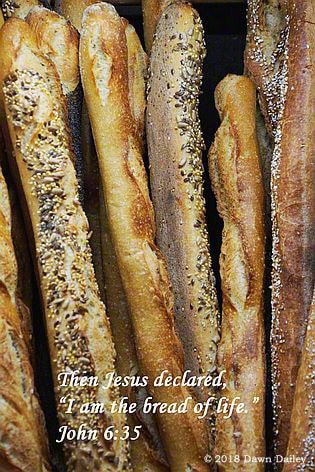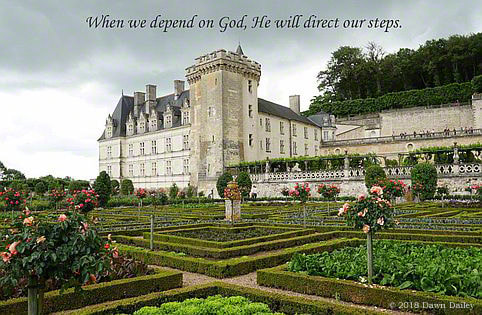French baguettes are intended to be eaten soon after they are baked to a golden crisp. It’s that crunchy exterior with the soft crumb (or mie, pronounced “mee”) inside that sets the baguette apart from its yeasty cousins. Try saving a baguette for the next day, however, and not only will you perhaps be paying a visit to your dentist after you break a tooth, you could use the rest of the baguette as a baseball bat! Because there are no preservatives in the oblong loaves, the crispy surface hardens overnight into something entirely inedible. I know. I’ve experienced it. Now I know to ask for a demi-baguette as sometimes I only really need half.
The French don’t seem to mind buying their baguette each day from their favorite boulangerie. The popular bakeries have lines down the sidewalk every morning. But the French are undeterred. They know what goodness awaits them as they patiently queue up. And the boulangères do not disappoint, making dozens after dozens of warm loaves every day.
The French baguette-a-day reminds me of an Old Testament story when the Israelites were wandering in the desert for 40 years. In Exodus 16, the Israelites grumble and complain about not having enough to eat and compare their present circumstances unfavorably to the slavery conditions in Egypt from which they had just escaped. They blame their leader Moses for delivering them out of slavery. They apparently forgot all the hard labor they endured, but they certainly remembered the good food they had eaten. Perhaps their memories deceived them into thinking the food and circumstances were better than they were.
In verse 4, God tells Moses that He will rain down bread from heaven for the people to gather each day. God gives strict orders for how the bread is to be gathered and except for preparing for the Sabbath each week, they are only to gather enough bread for that day. They called their bread “manna” which sounds like the Hebrew word for “What is it?”. A wafer-like substance, manna tasted like honey. If the people gathered more manna than they needed in one day (and they did), the manna would spoil and be useless. In the desert, the Israelites had to depend on God’s provision each day for their physical sustenance.
Bread is a symbol of God’s provision. The manna God rained down from heaven in the desert provided physical nourishment. God sent it, not because the Israelites were hungry and grumbling, but because they had forgotten who had delivered them from Egypt. It wasn’t Moses. It was God. God had provided a miraculous means for them to escape from slavery and He continued to miraculously provide for them physically in the desert.
In the Lord’s Prayer, found in Matthew 6, Jesus teaches His disciples to pray to God for their “daily bread” (verse 11). This bread, like the manna of the Old Testament, is a symbol of God’s provision. It’s interesting that Jesus taught His disciples (and us) to pray for what they needed even though God already knew what they needed. Only in relationship with God do we find we have everything we need. When we hunger after God and draw near to Him in prayer, He hears us. When we trust Him, He provides spiritual blessing after blessing. It is no coincidence that Jesus ties the concept of bread to our spiritual hunger when He declares Himself to be the “Bread of Life” in John 6:35. He reminds His followers that God provides and that when we trust God to meet our needs, He will bless us into that spiritually “abundant life” Jesus talks about in John 10:10. A life filled with peace, joy, love, and hope.
Thanks be to God that He doesn’t leave us hungry in the desert, but blesses us with His love and presence when we acknowledge Him as provider and when we ask for our “daily bread”. Unlike manna or baguettes or even buttery croissants, this spiritual bread will not become rotten, stale, or useless. The Bread of Life has come that we may have life and have it abundantly.
God, You are my Jehovah-jireh, my Provider. Thank You that You give me all that I need every day. May I experience the joy of Your presence and the overflowing goodness that comes from You. Amen.
Want to subscribe to future posts? Click here.
Text and photograph copyright © 2018 by Dawn Dailey. All rights reserved. Photo of croissants from a Parisian boulangerie.
All scripture quotations, unless otherwise indicated, are taken from the Holy Bible, New International Version®, NIV®. Copyright ©1973, 1978, 1984, 2011 by Biblica, Inc.™ Used by permission of Zondervan. All rights reserved worldwide. www.zondervan.com The “NIV” and “New International Version” are trademarks registered in the United States Patent and Trademark Office by Biblica, Inc.™



 RSS Feed
RSS Feed